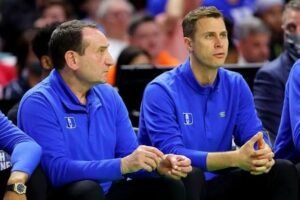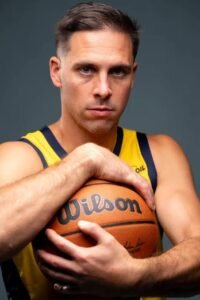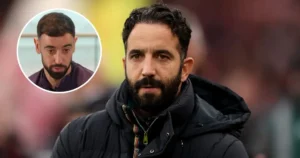
In a bombshell announcement that has sent shockwaves through the college basketball world, Jon Scheyer, the young and promising head coach of the Duke Blue Devils men’s basketball team, has stepped down from his position after just four seasons at the helm. The 38-year-old Scheyer, who succeeded legendary coach Mike Krzyzewski in 2022, cited personal exhaustion and a desire to prioritize family as the primary reasons for his abrupt departure. This move, confirmed late Tuesday evening by Duke Athletics Director Nina King, leaves the storied program in a precarious position just weeks before the start of the 2025-26 season, with major implications for recruiting, roster stability, and the Blue Devils’ perennial championship aspirations.
Scheyer’s tenure, while marked by undeniable success, was always under the immense shadow of Coach K’s five national titles and 1,129 career wins. Hired at the age of 34 as the program’s natural successor, Scheyer brought a fresh energy rooted in his own playing days as a Duke captain and All-American from 2006-10. He guided the Blue Devils to an Elite Eight in his debut season (2022-23), followed by a Final Four appearance in 2024-25—a remarkable feat considering the youth-heavy roster headlined by freshman phenom Cooper Flagg. Yet, behind the glossy highlights, insiders reveal a coach grappling with the unrelenting pressure of leading one of the sport’s bluest of blue-blood programs.
### A Promising Start Marred by Mounting Pressures
When Scheyer took over, expectations were stratospheric. Duke’s basketball machine, fueled by top-tier recruiting and NIL deals, demanded immediate results. His first three seasons delivered: 89 wins, multiple ACC titles, and deep NCAA runs. The 2024-25 campaign was a high-water mark, with a 35-4 record that included a dominant 32-point thrashing of archrival North Carolina on Scheyer’s senior night. Flagg, alongside recruits Kon Knueppel and Khaman Maluach, formed what many called the most talented freshman class in college hoops history, propelling Duke to the Final Four before a heartbreaking semifinal loss to Houston.
But the cracks began to show in the offseason. Key departures plagued the program: Flagg declared for the 2025 NBA Draft, guard Tyrese Proctor opted for professional opportunities abroad, and five-star recruit Shelton Henderson decommitted, flipping to LSU. The transfer portal, once a strength under Scheyer’s savvy recruitment, turned into a revolving door, with minimal high-profile additions. Whispers of locker room dissatisfaction—fueled by limited minutes for bench players like Isaiah Evans—circulated on social media and fan forums. Fans and analysts alike questioned Scheyer’s late-game decisions and in-game adjustments, drawing unfavorable comparisons to Krzyzewski’s tactical genius.
“Jon poured everything into this program—his heart, his soul, his family time,” King said in a prepared statement. “But the toll of those expectations has been immense. We respect his decision and wish him nothing but the best in this next chapter.”
Sources close to the program, speaking on condition of anonymity, paint a picture of a coach burned out by the 24/7 grind. Scheyer, married to Marcelle Scheyer with three young children, had been vocal about work-life balance in private circles. Recent personal milestones, including the birth of their third child earlier this year, reportedly tipped the scales. “He’d been expressing feelings of exhaustion for months,” one insider told ExtraSoccerNews. “The comparisons to Coach K were unfair from day one, but they wore on him like a weight he couldn’t shake.”
### The Immediate Fallout: Roster Chaos and Recruiting Ripples
The timing couldn’t be worse. With the season opener against Bryant on November 4, Duke’s roster stands at a precarious 13 scholarship players, leaving two open spots that Scheyer’s staff had planned to fill with depth pieces. Returning upperclassmen like Sion James and Caleb Foster provide some continuity, but the loss of Scheyer—a recruiting wizard who landed Flagg and the No. 1 class annually—threatens to derail the 2026 cycle. Top targets like five-star forward Nate Ament, who recently committed to Tennessee, were already slipping away.
On X (formerly Twitter), reactions poured in swiftly. “Another one bites the dust for Duke—Scheyer out, and now what? Portal frenzy incoming,” posted FanSided writer Lior Lampert. Others lamented the youth-heavy rotation concerns, with one fan noting, “If more kids leave, we’re back to square one.” The portal closes soon, but without a head coach, Duke’s pursuits for proven guards like Xaiver Scott from Princeton may fizzle.
Duke’s brass now faces a high-stakes search. Early names in the mix include Arizona’s Tommy Lloyd, a Krzyzewski disciple, and Harvard’s Tommy Amaker, a Duke alum with deep ACC ties. Wild cards like NBA assistants with Blue Devil connections—think Quin Snyder or even a return for Krzyzewski in an advisory role—aren’t off the table. “This is Duke. We don’t rebuild; we reload,” King emphasized, but the urgency is palpable.
### Legacy of a Reluctant Successor
Scheyer’s journey to this point was as improbable as it was inspiring. A sharpshooting guard who led Duke to the 2010 national title, his pro dreams were derailed by a freak eye injury in 2010 that cost him vision in his right eye. Pivoting to coaching at 23, he climbed the ranks under Krzyzewski, from special assistant to associate head coach, before inheriting the throne. His passion was never in question—teammates called him a “basketball savant” with a “contagious love for the Duke jersey.”
Yet, in the end, the job proved too much, too soon. Scheyer’s exit isn’t just a coaching change; it’s a referendum on the sustainability of Duke’s model in the NIL and transfer era. As one Reddit thread put it, Scheyer joined an elite club: Final Four appearances as player (2010), assistant (2015), and head coach (2025). But without a ring of his own, the narrative will forever be one of unfulfilled promise.
Duke fans, brace yourselves. The Blue Devils’ next chapter begins in crisis mode, and the basketball gods rarely grant second chances. Scheyer, meanwhile, steps away not as a failure, but as a reminder that even in Durham, humanity trumps hoops.






